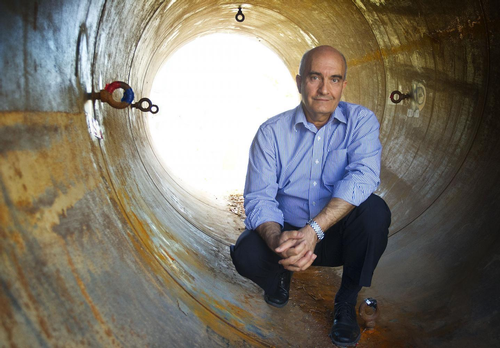FRIDAY, MARCH 31, 2023
A University of Texas at Arlington researcher recently received a $300,000 grant to evaluate a trenchless process for renewing sanitary sewer pipes in Soapstone Valley Park in Washington, D.C.
Led by associate professor in the Department of Civil Engineering Mohammed Najafi, the project will use a trenchless cured-in-place-pipe (CIPP) method that relines the old sewer pipe with new plastic material, which is cured in place with hot water.
“We will collect data on any possible air and water pollutants arising from resin once the curing is in progress,” said Najafi, who also is director of UTA’s Center for Underground Infrastructure Research and Education (CUIRE).
“Every 200 to 300 feet, there are manholes in this park. We’ll collect air and water samples before and after construction to see what volatile organic compounds and water pollution are there.”
Additionally, the team will investigate how far pollutants travel. UTA reports that the park is currently closed so the project can be completed.
“It’s very important to measure these possible pollutants, if any, because emissions may have long-term impacts on the health of workers and local residents,” Najafi said. “It’s a big and well-used park. We want people to be able to use it safely.”

 |
| University of Texas at Arlington |
|
A University of Texas at Arlington researcher recently received a $300,000 grant to evaluate a trenchless process for renewing sanitary sewer pipes in Soapstone Valley Park in Washington, D.C. |
Co-principal investigators include Melanie Sattler, the Syed Qasim Endowed Professor and interim chair of the Department of Civil Engineering; and Arpita Bhatt and Vinayak Kaushal, professors of instruction of civil engineering.
Sattler said this project has the capability of helping both people and the environment.
“It’s great that UT Arlington can help evaluate this sanitary sewer renewal method to ensure safety for workers and the public,” she said.
The one-year competitive grant was awarded from the Water Research Foundation, a nonprofit organization advancing the science of all water to meet the evolving needs of its subscribers and the water sector.
“The Soapstone Project includes the rehabilitation of defective sanitary sewer pipes, the rehabilitation of defective sewer manholes, protection of other sewer infrastructure assets, and repair of municipal separate storm sewer system outfall using a non-VOC/non-styrene-based resin and hot water cured trenchless Cured-in-Place-Pipe (CIPP) method,” wrote the foundation.
“This study is proposed to provide adequate sampling, testing and analysis to obtain the results necessary to make comprehensive and definitive conclusions, thereby filling the gaps and building on the work of previous studies.”
Soapstone Valley Park Sewer Rehabilitation
As part of its Capital Improvement Program, DC Water will perform sewer rehabilitation projects to address aging and defective sewer pipes. Benefits of the project reportedly include the rectification of an aging sewer system, improved structural integrity of the pipes while maintaining adequate hydraulic capacity, reduction of stream and groundwater infiltration, and mitigation for potential sanitary sewer overflows.
Work reportedly began for the project in March of last year, despite concerns from residents over the impact on human health of air pollution and water pollution caused by the project due to the CIPP method.
According to reports at the time, Soapstone Creek is one of the most polluted tributaries in the Rock Creek watershed, regularly testing with dangerously high levels of bacteria. The sanitary sewer pipes that run alongside the creek are reportedly 100 years old and at risk of failure due to erosion along the stream bed.
Additionally, in an inspection report from 2011, DC Water found cracks, fractures, holes, leaks or roots growing into the pipe in every section of the sewer.
Estimated construction completion is listed by DC Water as winter 2023 through 2024.
Tagged categories: Coatings; Colleges and Universities; Cured-in-place pipe (CIPP); Environmental Controls; Grants; Health & Safety; Health and safety; Linings; Ongoing projects; Pipes; Program/Project Management; Rehabilitation/Repair; Research and development; Sewer systems; Water/Wastewater